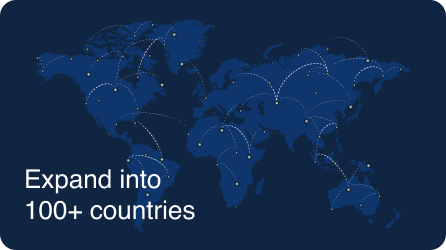“Cross-border employment allows companies to access a diverse talent pool, harnessing the power of global expertise and perspectives to drive innovation and success in an increasingly interconnected world.”
The above words are those of Indra Nooyi, the former CEO of Pepsico, and it precisely summarizes why cross-border employment is important in today’s integrated business environment.
With the advent of globalization and promoted by the pandemic, cross-border employment has become increasingly prevalent, with businesses expanding their operations globally and seeking talent beyond their national borders. Through this blog, we will discuss the importance of cross-border employment, its key considerations such as tax and payroll, immigration and work permits, employment contracts and policies, compliance, and risk management.
Cross-border employment – A quick glance
To put in simple words, cross-border employment refers to the practice of hiring employees who work in a country other than their country of origin. It involves the engagement of individuals who may relocate or commute internationally to fulfill their employment responsibilities.
These arrangements can occur in various forms, including expatriate assignments, remote work arrangements, and secondment agreements. The whole essence is that it makes skills available to bring out significant impacts.
Importance and Benefits of Cross-Border Employment
As we discussed earlier, the concept involves bringing talents from around the world working collaboratively so as to create better outcomes, be it for the business, product or service.
Cross-border employment offers several advantages for businesses operating on a global scale. Let’s explore some of the key benefits:
- Access to Talent: Cross-border employment allows organizations to tap into a diverse pool of talent worldwide. By expanding the candidate search beyond national borders, businesses can access individuals with specialized skills, knowledge, and experience, enhancing their competitive edge.
- Global Market Expansion: Employing individuals in different countries facilitates market expansion efforts. Local employees possess valuable cultural insights, language proficiency, and market knowledge, enabling businesses to better understand and cater to specific regional demands.
- Cost Efficiency: Depending on the location, cross-border employment can provide cost advantages. Hiring employees from countries with lower labor costs can help optimize expenditures while maintaining a high level of productivity.
- Flexibility and Agility: Cross-border employees bring flexibility to organizations, enabling them to respond swiftly to changing market dynamics and seize emerging opportunities. This adaptability is particularly valuable in industries where rapid international expansion is a priority.
Managing Cross-Border Employees
Successfully managing cross-border employees requires careful attention to various considerations, including tax and payroll obligations, immigration and work permits, and employment contracts and policies.
Tax and Payroll Considerations
Cross-border employment often triggers complex tax and payroll implications. Different countries follow different tax and payroll systems and it is the task of the employer to execute the tax handling as per the regulations of the particular country.
Employers must have to manage international tax laws, double taxation agreements, and social security regulations to ensure compliance. Seeking expert advice from tax professionals and implementing robust payroll systems can streamline this process considerably.
Get to know the taxes paid by employers and employees of different countries here.
Immigration and Work Permit Processes
Depending on the destination country, employing foreign workers may require obtaining work permits, visas, or other legal authorizations. Familiarizing oneself with immigration regulations and partnering with immigration experts helps ensure a smooth transition for cross-border employees.
Employment Contracts and Policies
Clear and comprehensive employment contracts and policies are crucial for managing cross-border employees effectively. These should address aspects such as compensation, benefits, working hours, leave entitlements, termination conditions, and intellectual property rights. Adapting contracts to comply with local labor laws while safeguarding the organization’s interests is essential.
Compliance and Risk Management
Compliance with local employment laws, data protection regulations, and industry-specific regulations is paramount when managing cross-border employees. Organizations must develop robust compliance frameworks to mitigate legal and reputational risks. Regular audits, training programs, and ongoing monitoring ensure adherence to both local and international regulations.
Global Workforce Trends and the Future of Cross-Border Employment
The global workforce landscape continues to evolve, driven by technological advancements and changing attitudes towards work. Let’s discuss some trends shaping the future of cross-border employment:
- Remote Work: The COVID-19 pandemic has accelerated the adoption of remote work arrangements. Companies are increasingly embracing remote and hybrid work models, allowing them to tap into global talent pools without the need for physical relocation.
- Gig Economy and Freelancing: The rise of the gig economy and the availability of freelance platforms enable businesses to engage specialized talent on a project basis. This flexible workforce arrangement allows companies to access expertise from around the world while keeping costs manageable.
- Enhanced Mobility Programs: Governments are recognizing the economic benefits of cross-border employment and implementing initiatives to attract skilled professionals. Enhanced mobility programs, streamlined visa processes, and talent exchange programs are expected to facilitate the movement of workers across borders.
- Focus on Diversity and Inclusion: Employers are placing a greater emphasis on diversity and inclusion in their workforce. Cross-border employment provides an opportunity to foster multicultural workplaces, enriching creativity, innovation, and collaboration.
Expand across borders with Multiplier
Cross-border employment presents unique opportunities for businesses to expand their reach, access global talent, and increase competitiveness in a rapidly evolving marketplace. However, managing cross-border employees requires a thorough understanding of legal, compliance, and operational complexities. It is at this point Multiplier comes to your rescue.
Multipliers smoothly handle your tax and payroll considerations, immigration processes, employment contracts, and compliance frameworks, thus helping businesses harness the full potential of a global workforce.
Embrace emerging trends with Multiplier to thrive in the future of cross-border employment.


